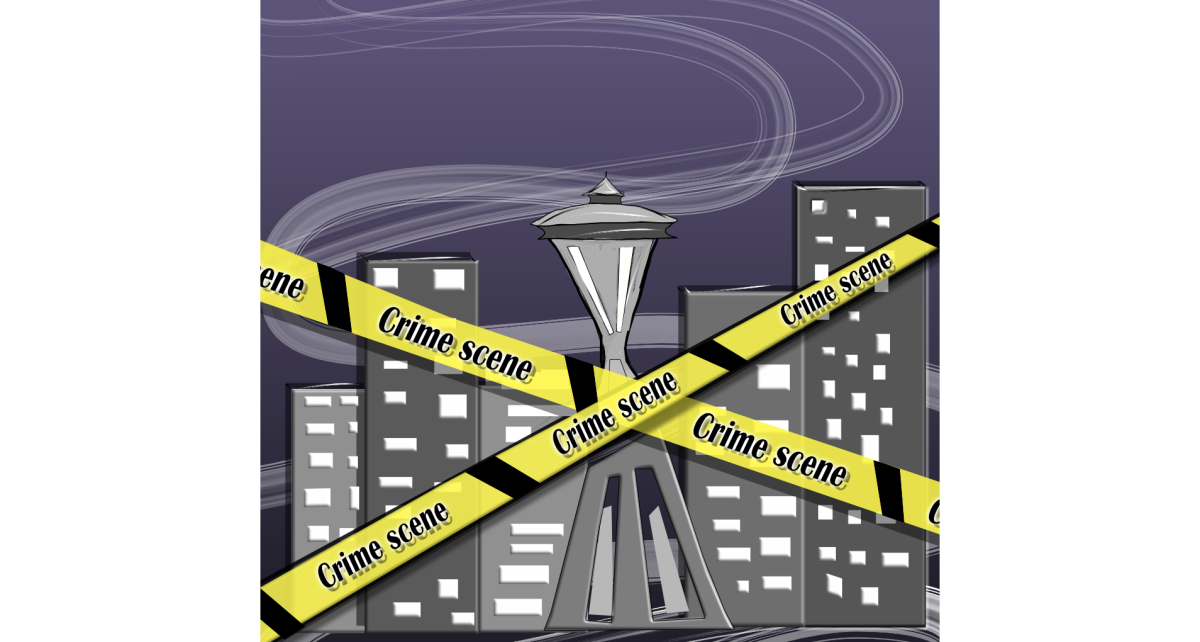According to official Seattle Police Department (SPD) records, violent crime is on pace to decline for the second year in a row. While property crime remains on a similar trend as 2023, the numbers are still lower than the 15-year high the city experienced in 2022.
Now, the City of Seattle is attempting to lower rates even more by bringing up new bills to combat crime. These include the Stay Out of Area Prostitution (SOAP) and Stay Out of Drug Area (SODA) that went into effect Oct. 23, a proposed bill to address high levels of nightclub shootings, and the Downtown Activation Team (DAT), a team created by Mayor Bruce Harrell to clean up the 3rd Avenue and Pike/Pine Street area.
Students and faculty alike have varying opinions on these bills’ potential effectiveness. Below is an explanation of each new proposal and how people are reacting to them.
SOAP and SODA
SOAP and SODA are bills that deter people who are awaiting trial for prostitution or drug-related charges from entering designated zones. This bill gives the power to police to enforce this measure.
Kamil Zaidi, a second-year political science major, discussed how the SODA and SOAP bills are good in theory but not in practice. Zaidi argued that the legislation will help the City of Seattle combat crime. However, he believes it will not address the issue of drugs and prostitution at its root.
“The hesitations I have with the bill is that I feel it could be encampment suites in a city, barring folks from going into a certain part or certain section of the city doesn’t stop them from carrying out those listed activities somewhere else. Right? You’re just moving them around,” Zaidi said.
The bills target parts of Capitol Hill, Downtown, Pioneer Square, University District, Chinatown International District and Aurora Ave. Zaidi argued that the bills could cause more harm than good, as they force drug users and prostitutes to move elsewhere, which he believes police cannot handle.
Fourth-year Environmental Studies Major Benjamin Conroy believes there might be better solutions than these bills, which he feels are just temporary solutions.
“I don’t think that these bills are good as a deterrent because crime, in my opinion, is always gonna happen. People are always gonna want to do this type of stuff or in the case of the SOAP bill. They are forced to do this type of thing,” Conroy said.
Seattle’s Nightclub Shooting Bill
Former City Councilmember Tanya Woo proposed legislation Oct. 28 to address the recent shooting related to after-hours nightclubs in the City. The bill hopes to establish a new regulatory license for operating after hours between 2 and 5 a.m.
The bill, however, might be put on hold, as Woo was defeated by Alexis Mercedes Rinck in the special election for one of the council’s two citywide seats.
The bill is still in people’s minds as Rinck was sworn in Nov. 26.
“I’m interested to see if that legislation continues to be enacted after she leaves the Council,” Zaidi said.
Downtown Activation Team
This executive order by Mayor Harrell is tasked with reducing crime and emergency calls in downtown Seattle. The project was piloted in early September of this year. It has shown success in decreasing violent crimes in the 3rd and Pike/Pine area by 27%, emergency service calls by 14% and emergency medical responses by 30% compared to last year.
Zachary Wood, assistant professor of public affairs at Seattle U, explained the implications of this order.
“The understanding of the downtown activation plan at this point is essentially the extensions of trying to clear out criminal behavior, drug use, open drug use and homelessness, which, homelessness the sort of clustering of either encampments or clustering of spaces in public land,” Wood said.
Wood argued that this team is part of Mayor Harrell’s bigger plan to bring people back to downtown Seattle. He stated that homeless individuals are known to use vacant business buildings, which increases drug use. Part of the bigger plan is to revive these businesses in order to get people back into their offices.
“The less active a place is, the less typical workday sort of use that a space has, the more folks that maybe would be deemed as undesirable are going to take and use that kind of space,” Wood said.
Conroy talked about how in the past, the City of Seattle tried to implement this law, but it backfired due to potential profiling issues.
“I haven’t seen anything about rectifying any of that from the past. So I’m a little worried that cops might just start doing that again,” Conroy said.
The City of Seattle has had difficulty facing crimes in recent years, with the rise of drug use and homelessness. Implementing these bills is difficult for some satellites, and there are different opinions on how it will work. The only proof that these bills will work is time.








